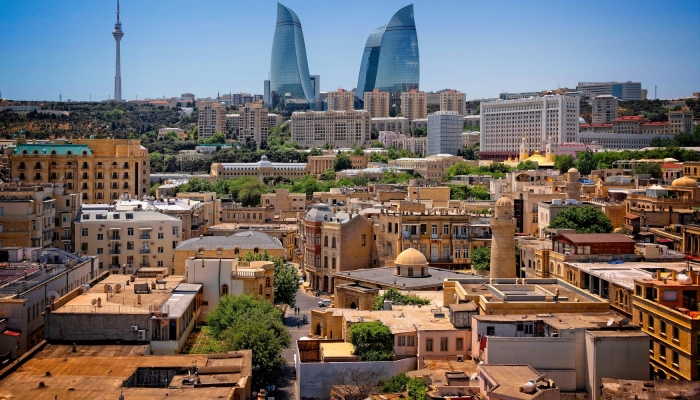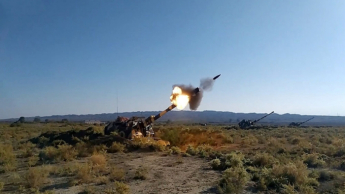Baku tea drinking or thirty years later

|

Next April Azerbaijan and Israel are going to celebrate the 30th anniversary of the establishment of diplomatic relations between our two countries. The date is not round and the period by historical standards is relatively short. And that's why it's much more surprising that during this time the two countries managed to reach such level of cooperation and mutual trust that other states waste centuries for.
Next April Azerbaijan and Israel are going to celebrate the 30th anniversary of the establishment of diplomatic relations between our two countries. The date is not round and the period by historical standards is relatively short. And that's why it's much more surprising that during this time the two countries managed to reach such level of cooperation and mutual trust that other states waste centuries for.
It is important to emphasize that in the early 90s of the XX century, when Azerbaijan became a member of the Organization of Islamic Cooperation (OIC) and along with other OIC countries supported the boycott of the Jewish State and the armed struggle that the Palestine Liberation Organization was waging against it, no one could have imagined such development of the events. Then it seemed that Israel and Azerbaijan - two countries that do not have common borders and solve their problems within the framework of distant from each other social, economic and religious paradigms, are doomed by fate to remain on opposite sides of the eternal confrontation between East and West.
But the nearest future proved the absolute inconsistency of these forecasts.
Having shown a healthy pragmatism, open-mindedness and flexibility of thinking, the political leaderships of Azerbaijan and Israel managed, ahead of their time, to build a unique system of relations between two countries, most of which, like an iceberg, were hidden not only from the general public, but also from most allies who were not ready for such a drastic change in foreign policy. Thus, the leaders of the two countries proved in practice that modern bankers borrowed the maxim about "money that does not like noise" from political strategists who think in terms of the future.
Such politicians were the Presidents of the State of Israel Shimon Peres and President of the Republic of Azerbaijan Heydar Aliyev - two outstanding statesmen of the post-war generation, two experienced diplomats, two unsurpassed masters of planning and organizing secret negotiations.
And if the peak of Shimon Peres's achievements in the sphere of "non-public" diplomacy became the Nobel Peace Prize for the Norwegian agreements reached at a time when any contact with representatives of the PLO was punished in Israel by a long prison sentence, then Heydar Aliyev became the first leader of the state in the Muslim world to lay the foundations of strategic alliance with Israel and at the same time managed to preserve the membership and authority of Azerbaijan in the camp of irreconcilable opponents of the Jewish State.
In 1997, the President of Azerbaijan shared his views on the principles of the proposed partnership with the Prime Minister Benjamin Netanyahu.
Today, a quarter of a century after the famous "Baku tea party" (accepting Heydar Aliyev's invitation "for a cup of tea," the Israeli prime minister's Boeing, returning to Tel Aviv from Delhi, landed for several hours at the Baku Bina airport), its results need no comments...
What about the reasons that 24 years ago determined the full understanding and agreement of the parties, then, in the opinion of the majority of Israeli analysts, there were two of them: Israel's dependence on oil imports and Azerbaijan's desire to re-equip the army in a short time so that, if peace talks on Karabakh will finally come to a dead end, to return the Azerbaijani territories occupied by Armenia by force.
But in my opinion, everything is not so simple ...
Undoubtedly, the oil-for-arms trade, the annual volume of which today is over $ 5 billion, as well as an agreement on mutual protection of investments and the absence of double taxation, were beneficial for both parties:
Azerbaijan received high-tech weapons from Israel, dual-use electronics, unmanned strike and reconnaissance vehicles, navigation and control systems, optics, high-precision ammunition, and Israel became the second importer of Azerbaijani oil in terms of purchases and together with the natural gas reserves found in territorial waters, in fact, got rid of chronic energy dependence.
And, nevertheless, explaining only the economic benefits of the current level of the Azerbaijani-Israeli partnership is most likely a superficial conclusion. As confirmed by Israeli Prime Minister Benjamin Netanyahu, who stated during one of his briefings:
“We will not sell weapons to any country that will be at war with Azerbaijan. We were not given such a condition, our decision stems from the principle of loyalty and friendship of Israel in relation to Azerbaijan ... ”.
If we follow Benjamin Netanyahu's logic, then business in relations between the two countries is, of course, an important factor, but not a determining one. But what, in this case, is the core in the relations between the two countries?
In response, one can name Israel's constant support for the territorial integrity of Azerbaijan, and Azerbaijan's common border with the existential enemy of Israel, Iran, and the refusal of the Knesset to recognize the Armenian genocide of 1915, and the support provided to Azerbaijan by international Jewish organizations, and the 70,000 Azerbaijani diaspora in Israel. Jewish communities in Baku, Ganja, Cuba, Qusar...
But in my opinion, the cementing basis of the Azerbaijani-Israeli partnership was and remains to this day the ability of its leaders and leading players not to publicize some of the nuances of bilateral cooperation that can destroy in a few minutes what has been created for decades.
This is exactly what Shimon Peres meant, who commented on his refusal to convey the details of the negotiations with one of the Arab politicians with the following phrase:
"The Israeli press made dictatorship impossible, democracy intolerable, and secret negotiations meaningless! .."
Confirming this conclusion, I would like to return to the festive fireworks, which have recently died down in honor of Azerbaijan's victory in the Karabakh war, and ask the question:
“Who else, besides Turkey, sincerely rejoiced at this victory together with the Azerbaijani people? Maybe France, which was the co-chair of the OSCE Minsk Group and turned 29 years of negotiations on Karabakh into "horror without end"? Or maybe Russia, who is calling Azerbaijan a strategic partner and at the same time equipping Armenia with ballistic missiles? Or Shiite Iran, half of the population of which are ethnic Azerbaijanis?... ".
So, Israel, whose weapons largely determined the outcome of the Karabakh war, did not suit fireworks on this occasion, did not send congratulatory telegrams to Azerbaijani generals, did not comment on articles in the Western media about how Azerbaijani transport planes landed at its air force bases ...
Israel, as usual, was silent. And he was happy. As a true friend who is known not in trouble, but in joy. And as a tried and tested partner who clearly understands: the interaction of countries representing largely different worlds doesn't like noise. This is the very silence, which is more expressive than any speech...
The author is a famous Israeli writer, deputy of the 17th convocation of Israel's Knesset, former Ambassador of Israel to Belarus, the founder and the first president of the Israel-Azerbaijan International Association "AZIZ", holder of the Dostlug Order for his contribution to the development of the Israeli Azerbaijani relations.
(If you want to contribute and have specific expertise, please contact us at [email protected])
The Rocket and Artillery formations of the Azerbaijan Army conduct live-fire exercises in accordance with the combat training plan for 2021, the Ministry of Defense of Azerbaijan told Baku Tribune.
LAST NEWS






.jpg&h=67&w=67&zc=1&q=100)













